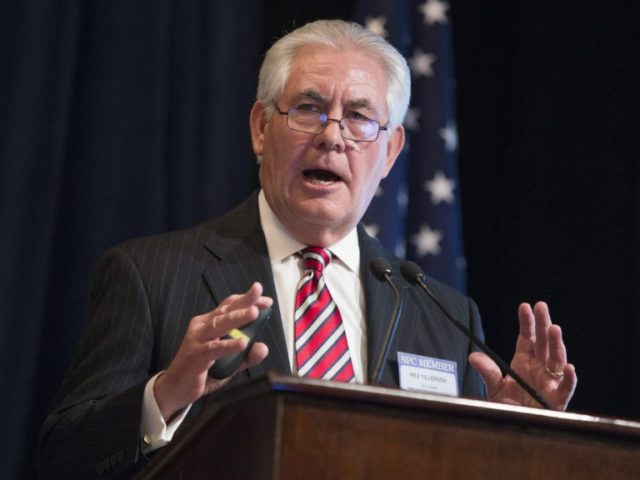Secretary of State nominee Rex Tillerson is a successful leader and business man – no doubt. Exxon Mobil, under his leadership, is one of the most profitable companies in the world with a global reach and relationships.
But managing a global enterprise is far different than managing hundreds of global crises that are not measured in dollars and barrels, but in lives and freedom.
One of the most pressing concerns, largely ignored by the Obama Administration, is America’s first freedom – religious liberty—and its application to US policy devised in Foggy Bottom.
As America’s chief diplomat, Tillerson should commit to protecting the rights and freedoms of the oppressed the world over.
Here are the three questions the Senate Foreign Relations Committee must ask Tillerson:
1) Will you advise your colleagues and the president to include religious freedom and respect for human rights in the National Security Strategy and embed it in all relevant agency protocols, strategic documents, and diplomatic training as a core pillar of US policy at home and abroad?
Because the Obama Administration’s abdication of American leadership on this human right is well known. The Ambassador-at-Large for International Religious Freedom, a position mandated by the International Religious Freedom Act, has been vacant for half of the current administration. Religious freedom was erased from the National Security Strategy, the religious factors in conflict ignored, and global terrorists groups grew by 58% under Obama’s administration.
In late 2016, Congress responded by passing the Frank R Wolf International Religious Freedom Act of 2016 to strengthen IRFA. The bill will provide President-Elect Trump an opportunity to restore America’s leadership on religious freedom during his administration.
The Foreign Service Institute must also revise human rights courses and make them mandatory for all U.S. diplomats. At the same time, the Ambassador can work with other agencies to increase public literacy about the Ambassador’s role and importance of religious freedom in foreign policy and American history.
2) Will you tie foreign aid and all international assistance funding (including United Nations) to encourage respect for human rights and religious freedom?
Because the State Department needs to outline a concrete plan for improving legal and social respect for religious freedom in countries of particular concern. While this may seem obvious, it has never been attempted. To date, U.S. policy has only been reactive. Confronting the challenges of global terrorism in the name of religion requires a proactive strategy – and at the forefront of the plan should be specific measures to build local sustainable leadership for this right globally.
We must incorporate conditions to foreign aid on respect for religious freedom and create a special bi-lateral dialogue in countries with deteriorating records on religious freedom with special attention to supporting efforts in countries at risk of being de-stabilized by religious extremism. If the lessons of Iraq have taught us anything, it is that countries will never stabilize without this freedom, no matter how much support we give them to defend against groups like ISIS.
3) Will you prioritize persecuted religious minorities for refugee resettlement including Iraqi and Syrian Christians and Yazidis who face an existential threat in the genocidal campaign of ISIS?
While pre-war Syria was 10% Christian with hundreds of thousands of other religious minorities, only half of 1% of the nearly 13,000 Syrian refugees the State Department resettled were Christians and 24 (sic) were of the deeply persecuted Yazidi faith, targeted by ISIS for extermination and sexual enslavement. More than 98% of the refugees were of the majority Muslim faith.
While Muslims deserve religious liberty as much as any other group, the discrimination (intentional or not) against religious minorities is unacceptable.
Iraqi and Syrian Christians (and other persecuted groups) should be prioritized in refugee resettlement programs. America has historically prioritized many persecuted groups, and now is the time to help a community that has no alternative for local resettlement. The State Department under Tillerson can privilege private sector efforts to meet the humanitarian and resettlement needs with a specific focus on nuclear families, orphans and widows.
Before his confirmation, Tillerson must outline the incoming Trump Administration’s commitment to religious freedom abroad clearly and boldly. One way to do that would be to appoint an Ambassador-at-Large for International Religious Freedom in the first 100 days. It would be a tangible and symbolic step toward restoring religious liberty to its rightful place at the forefront of American foreign policy.
If we can protect religious freedom abroad, we will have greater freedom at home. And if we understand this freedom at home, we will preserve it around the world to ensure that it is never taken from us.
If we don’t, who will?
The past eight years have seen more domestic challenges to religious freedom than faced under any other president. At the same time, American leadership abroad was lacking. We cannot afford to jeopardize this freedom domestically or abdicate our role internationally. The world is watching and global respect for religious freedom hangs in the balance. The lives of billions of people depend on it.
Tina Ramirez is the president and founder of Hardwired Global, a nonprofit that works with religious minorities and persecuted groups in the Middle East and around the world to promote religious freedom. Previously, she served as staff director of the House International Religious Freedom Caucus.

COMMENTS
Please let us know if you're having issues with commenting.